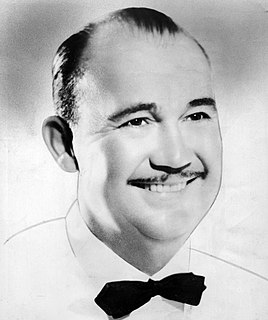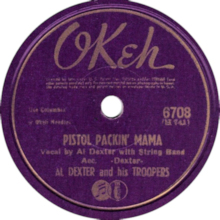Related Research Articles

Paul Samuel Whiteman was an American bandleader, composer, orchestral director, and violist.

"In the Mood" is a popular big band-era jazz standard recorded by American bandleader Glenn Miller. "In the Mood" is based on the composition "Tar Paper Stomp" by Wingy Manone. The first recording under the name "In the Mood" was released by Edgar Hayes & His Orchestra in 1938.

Tenacious D is an American comedy rock duo formed in Los Angeles, California, in 1994. It was founded by actors Jack Black and Kyle Gass, who were members of The Actors' Gang theater company at the time. The duo's name is derived from "tenacious defense", a phrase used by NBA basketball sportscaster Walt Frazier and Marv Albert.

Clarence Albert Poindexter, known as Al Dexter, was an American country musician and songwriter. He is best known for "Pistol Packin' Mama," a 1943 hit that was one of the most popular recordings of the World War II years and later became a hit again with a cover by Bing Crosby and The Andrews Sisters.
"You Are My Sunshine" is a song copyrighted and published by Jimmie Davis and Charles Mitchell in 1940. According to BMI, it has been recorded by more than 350 artists, and translated into 30 languages. In 1977, the Louisiana State Legislature decreed that "You Are My Sunshine" would be a state song, to honor two-time governor Jimmie Davis.
"It's April Again" is a popular song that first appeared in the 1952 film Moulin Rouge. It became a No. 1 hit in the UK Singles Chart when recorded by Mantovani. The music for the film was written by Georges Auric; the original French lyrics were by Jacques Larue, with the English words by William Engvick. The Auric-Engvick song was published in 1953.

Look What I Almost Stepped In... is the eighth studio album by the southern California punk rock band The Vandals, released in 2000 by Nitro Records. It was recorded in April 2000. It was the band's final album for Nitro, as they moved to their own label Kung Fu Records the following year.

"I'll See You in My Dreams" is a popular song, composed by Isham Jones, with lyrics by Gus Kahn, and published in 1924. It was recorded on December 4 that year, by Isham Jones conducting Ray Miller's Orchestra. Released on Brunswick Records, it charted for 16 weeks during 1925, spending seven weeks at number 1 in the United States. Other popular versions in 1925 were by Marion Harris; Paul Whiteman; Ford & Glenn; and Lewis James; with three of these four reaching the Top 10.

"Pistol Packin' Mama" was a "Hillbilly"-Honky Tonk record released at the height of World War II that became a nationwide sensation, and the first "Country" song to top the Billboard popular music chart. It was written by Al Dexter of Troup, Texas, who recorded it in Los Angeles, California on March 20, 1942, with top session musicians Dick Roberts, Johnny Bond and Dick Reinhart, who all normally worked for Gene Autry).
"Rosalita" is a 1942 song performed by Al Dexter and His Troopers. It was recorded on March 18, 1942 at the CBS Studio at Radio Station KNX, Sunset Blvd., Hollywood, California with session musicians Frank Marvin, Johnny Bond and Dick Reinhart. It was released on Okeh Records #6708 in March 1943, paired with "Pistol Packin' Mama". After the "Most Played Jukebox Folk Records" chart was established on January 8, 1944., it remained for six months, peaking at #1 on March 11, 1944.
"So Long Pal" is a 1944 song by Al Dexter and His Troopers. The song was the follow-up to Al Dexter's two-sided hit, "Pistol Packin' Mama"/"Rosalita". It was recorded on March 18, 1942, along with "Rosalita" and the b-side "Too Late to Worry, Too Blue to Cry". "So Long Pal" stayed at the number one position on the Folk Juke Box chart for thirteen weeks in 1944. The B-side would also hit number one on the same chart.
"Too Late to Worry, Too Blue to Cry" is a 1942 song by Al Dexter. It was recorded on March 18, 1942 at the CBS Studio at Radio Station KNX, Sunset Blvd., Hollywood, California with session musicians Frank Marvin, Johnny Bond and Dick Reinhart. It was released on Okeh records #6718 on February 6, 1944, paired with "So Long Pal". It went to number one on the Folk Juke Box charts for two weeks and stayed on the charts for a total of thirty weeks.
"Among My Souvenirs" is a 1927 song with words by Edgar Leslie and music by Horatio Nicholls.
"I'm Losing My Mind Over You" is a 1945 song by Al Dexter and His Troopers. The song was Al Dexter's fifth release as well as his fifth number one on the Folk/Juke Box charts. The B-side of the song, entitled, "I'll Wait For You Dear" peaked at number two on the same chart.
"Guitar Polka" is a 1946 instrumental song by Al Dexter and His Troopers. "Guitar Polka" spent sixteen weeks at number one on the Juke Box Folk charts and a total of twenty-nine weeks on the chart.

Days of Wine and Roses and Other TV Requests is the eleventh studio album by American pop singer Andy Williams and was released in April 1963 by Columbia Records following his first season as host of his variety series, The Andy Williams Show. The LP has a studio recording of the closing theme from the show, "May Each Day", and continues the format of his previous Columbia releases by including songs from the 1920s, 1930s, 1940s, and 1950s.

"The Last Letter" is a song written by country music singer Rex Griffin. Griffin wrote the song in 1937, after he was left by his wife. The song tells through a suicidal letter the feelings of an older man who is left by his young wife. The song, released on Decca Records became a hit for Griffin.

"I Can't Help It " is a song written and originally recorded by Hank Williams on MGM Records. It hit number two on the Billboard country singles chart in 1951. In his autobiography, George Jones printed the first six lines of the song and stated, "Its lyrics couldn't be more simple - or profound."
"Honey, Do You Think I'm Wrong" is a country music song written by Al Dexter and Frankie Marvin, performed by Al Dexter and His Troopers, and released on the Columbia label. In February 1946, it reached No. 2 on the folk chart. It spent eight weeks on the charts and was ranked as the No. 12 record in Billboard's year-end folk juke box chart. It was the "B-side" to "Guitar Polka" which peaked at No. 1.
References
- ↑ Library of Congress. Copyright Office. (1939). Catalog of Copyright Entries 1939 Musical Compositions New Series Vol 34 Pt 3 For the Year 1939. United States Copyright Office. U.S. Govt. Print. Off.
- ↑ "Wine, Women, And Song 1946". 45worlds.com. Retrieved 16 July 2021.
- ↑ "Wine, Women, And Song". discogs.com. Retrieved 16 July 2021.
- ↑ "Vocalion". 78discography.com. Retrieved 16 July 2021.
- ↑ "Al Dexter". countrydiscoghraphy2.blogspot.com. Retrieved 16 July 2021.
- ↑ "Al Dexter and His Troopers". aldexter.com. Archived from the original on 2012-07-24. Retrieved 16 July 2021.
- ↑ Whitburn, Joel (2004). The Billboard Book Of Top 40 Country Hits: 1944-2006, Second edition. Record Research. p. 104.